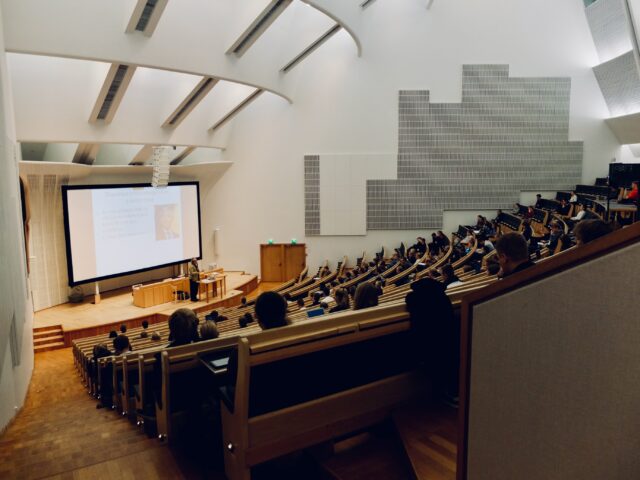The Center for World University Rankings (CWUR) has released its Global 2000 list for 2023. The list summarizes the top 2,000 universities from a pool of 20,500 institutions based on metrics such as education quality, alumni employment, and research performance. Many Canadian institutions ranked high on the list, with the University of Toronto and McGill University ranking 23rd and 26th respectively. Other Canadian universities that placed in the top 1% of universities worldwide were the University of British Columbia (#51), University of Alberta (#76), Université de Montréal (#122), McMaster University (#174), Western University (#188), and University of Calgary (#195).

Top Ten News
May 17, 2023
Memorial University’s Fisheries and Marine Institute has officially opened The Launch. The lab offers a near-Arctic environment which will be used for technology testing, training, and exploring advancements in ocean research. Students will use the facility as they participate in experiential, at-sea education opportunities. “The Launch is a focal point for expanding our knowledge, collaborations and community partnerships,” said Memorial President, pro tempore Dr Neil Bose. “The Launch strengthens Memorial’s leadership in at-sea education and research.”
Algoma University and Peel District School Board (PDSB) are piloting a program that creates a pathway into postsecondary education for underrepresented youth. Secondary school students from Black, Indigenous, and other marginalized or underrepresented communities will have the opportunity to attend classes on the university’s campus and earn postsecondary credits while receiving supports to fulfill their Ontario Secondary School Diploma requirements uninterrupted. AlgomaU and PDSB have also partnered with Unity Technologies Inc to provide participating students with the opportunity to earn an Associate Game Developer Certification. PDSB Director of Education Rashmi Swarup noted that the program promotes belonging, confidence, and academic success while preparing students for future careers in the skills-based economy.
Holland College’s Atlantic Police Academy and the Government of Prince Edward Island have partnered to offer the Accelerated Correctional Officer Training Program to PEI residents at a reduced cost. Students in the five-month program learn skills related to intervention and de-escalation, crisis management, Canadian law, ethics and professionalism, and workplace health and safety. Three seats in the program are reserved for BIPOC students, who will receive a full tuition subsidy. The Canada-PEI Labour Market Development Agreement and Workforce Development Agreement will provide other students with a 70% tuition subsidy.
In a recent article for the Journal of Academic Ethics, Guy J Curtis discussed the relationship between students’ feelings of guilt and shame and their perceptions and intentions around academic misconduct. Curtis tested 459 students’ proneness to guilt and shame, expectations of feelings of guilt and shame if they engaged in academic misconduct, and their intentions to engage in academic misconduct. The test found a negative correlation between guilt and shame proneness and academic misconduct intentions. Some students reported lower levels of anticipated guilt, which Curtis suggested came from being undetected in the past. With this in mind, Curtis theorized that the prospect of being caught was potentially an even stronger deterrent than a student’s own moral code, and so institutions looking to discourage academic misconduct must take a multipronged approach to do so.
The University of Guelph will host the Canadian Advanced Therapies Training Institute’s (CATTI) new cell and gene therapy (CGT) training centre. CATTI will use UoGuelph’s labs to provide a hands-on learning program for postsecondary graduates, professionals, and companies in the CGT field. The training centre’s development was facilitated through a partnership with UoGuelph, OmniaBio Inc, and the Centre for Commercialization of Regenerative Medicine (CCRM). “This [training site] is a first for Canada, and I’m pleased to see this coming to fruition so quickly as it will benefit Canadians by fostering a strong, domestic biomanufacturing industry,” said CCRM President Michael May.
Dalhousie University and McGill University are taking steps to lessen their environmental impact. Dal will be embarking on renovations to improve the energy efficiency of the Killam Memorial Library this month. The deep energy retrofit will reduce water and energy use and improve building performance. At McGill, some labs are turning up the temperature of their freezers to reduce the environmental impact and increase the lifespan of their equipment. McGill is encouraging lab users to participate in the International Freezer Challenge to save energy when storing research samples.
Alberta high school students affected by the ongoing wildfire evacuations will be exempt from writing their upcoming diploma exams, according to provincial officials. “This means that a student who has been displaced from a school as a result of the wildfires for 10 or more school days is automatically exempted from writing their diplomas this June, and not have it count against their final grades,” announced Colin Blair, Executive Director of the Alberta Emergency Management Agency. If a student is exempt from the diploma exam, their classroom mark alone will be used as the final grade; Blair added that if students do not want the exemption, they can write their exams in a different community this June or wait to write them until August.
In an op-ed for the Chronicle of Higher Ed, James M Lang offers tips for teachers looking to become more mobile-mindful in the classroom. Lang proposes that instead of being seen as mindless-scrolling devices, smartphones should be viewed as tools for student learning. The author suggests that teachers should reflect on their course content to ensure it is mobile-friendly and embrace mobile study applications, like flash-card deck tools. “For years now, my conversations with students about phones have focused on how we can make sure they don’t interfere with learning,” Lang writes. “This fall, I will still have that conversation – but it will be folded into a larger discussion about how digital tools can both diminish and support learning.”
The University of Regina’s Internet-delivered cognitive behavioural therapy (ICBT) program recently received $400K in additional funding from the Government of Saskatchewan. The online therapy program provides free, virtual access to mental health and addictions treatment for individuals based anywhere in the province, including in rural and remote areas. ICBT was established under the leadership of URegina’s Dr Heather Hadjistavropoulos through a partnership with the Saskatchewan Health Authority. “Our clients tell us they prefer this method of mental health care and get incredible results that improve their mental health and well-being,” said Hadjistavropoulos. “This funding ensures that our services will now be able to benefit even more Saskatchewan residents.”
